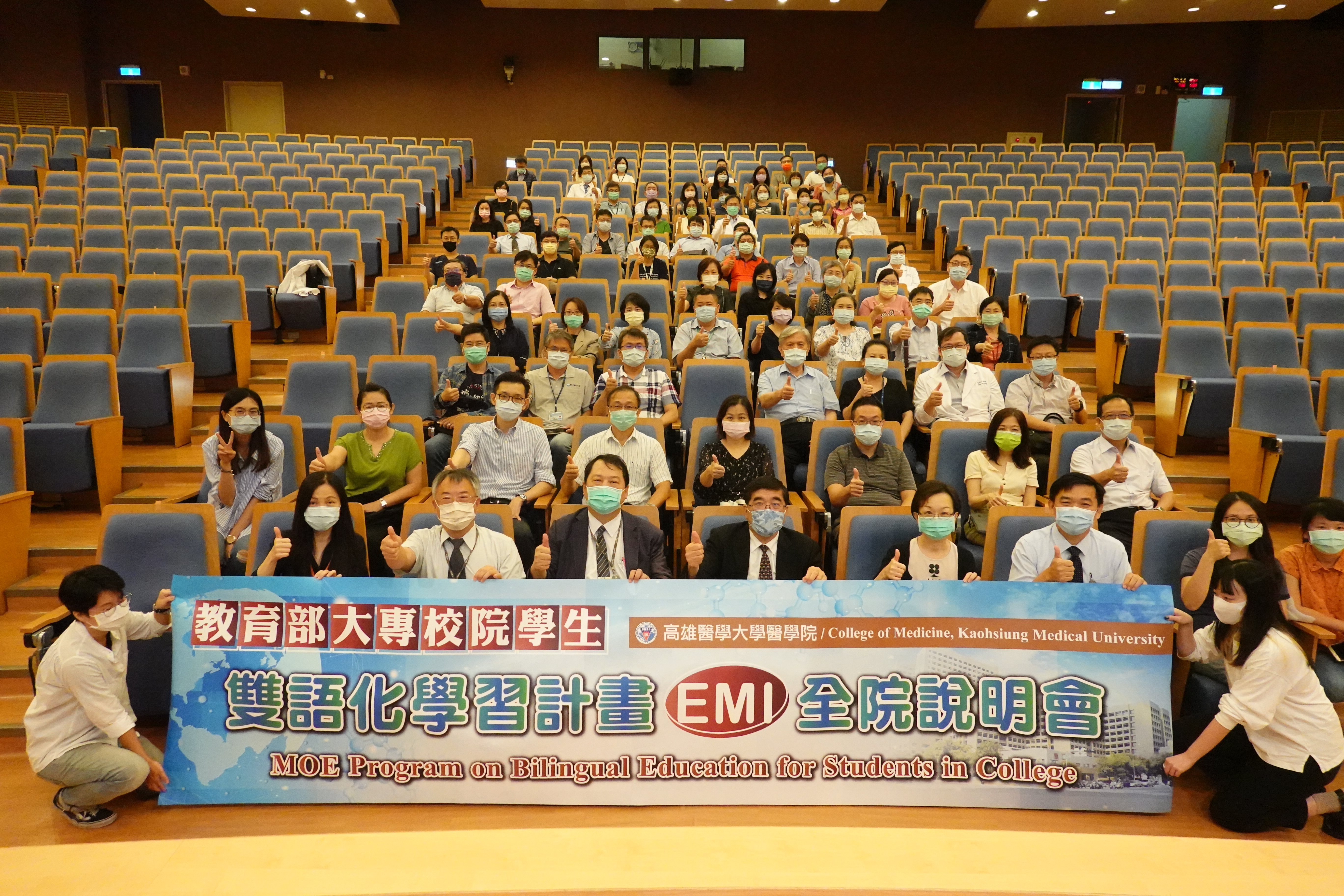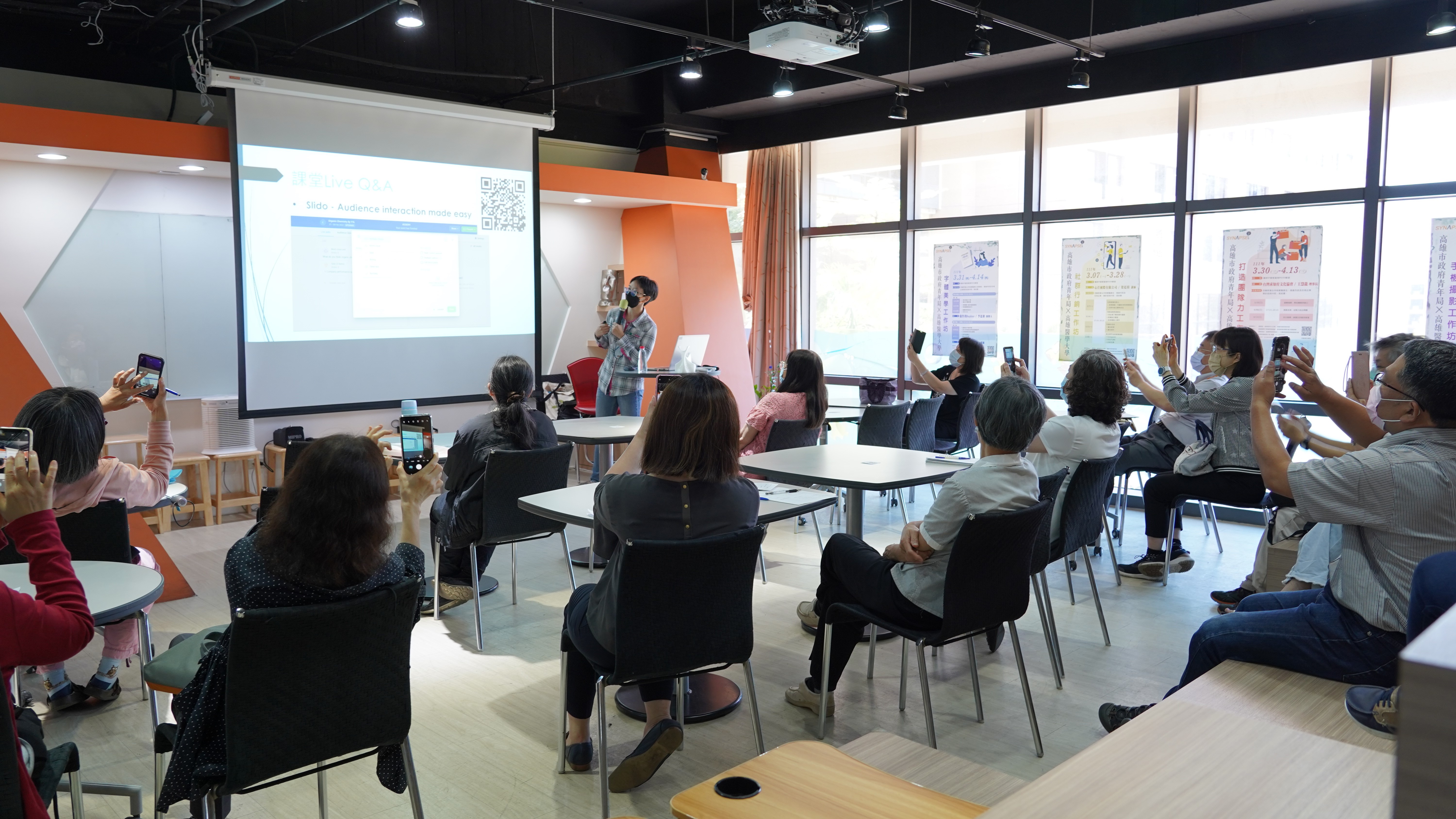Abstract
Kaohsiung Medical University
Features and Achievements of Key Cultivation College Program
“Forge the consensus, strengthen the teachers’ EMI skills, and improve the students’ English ability” is the crucial goal of KMU’s Medical College in implementing the MOE’s bilingual education program in the first stage. Collaborating with KMU’s Medical College, the school-level “Bilingual Education Promotion Center” have born fruitful results in the three dimensions of teacher’s teaching ability, curriculum planning and course quality assurance, and student learning, through the implementation of school policies, including “EMI Course Planning,” “EMI Policy Consensus Building,” “Teacher Development and Support System Construction,” “Student Self-study Incentive Program,” “Course Quality Control Mechanism,” and “EMI Teacher and Student Questionnaire.” The efforts and highlights of last year are summarized as follows:
【Teacher’s Teaching Ability】
- Diverse and flexible training programs that enhanced teacher’s ability in teaching medical-related courses in English:
- Online EMI training courses: A total of 80 teachers of Medical College participated in the Cambridge University’s online training course “Certificate in EMI Skills,” while two seed teachers were sent to take the online course “Oxford EMI Certificate for University Lecturers.”
- English Teaching Workshop: Professional foreign teachers were invited to help teachers to brush up on English speaking pronunciation and presentation skills. A total of 58 sessions were held in the 110 Academic Year, with 51 participants receiving certificates from KMU. In addition, the General Education Center conducted 12 sessions of one-on-one EMI consultations.
- Inter-school EMI Training Program: Collaborating with the Southern Regional Resource Center for Bilingual Education (National Sun Yat-sen University) and the Southern Regional Technical and Vocational Resource Center for Bilingual Education (Wenzao Ursuline University of Languages), 15 EMI seed teachers from KMU’s Medical College completed the EMI training, the program of which included teaching demonstration and on-site feedback.
- Mock teaching and peer observation: To help teachers be familiar with English teaching environment and gain more experiences through practice, eight sessions of online mock teaching were held in the 110 Academic Year. Each session included one KMU teacher for mock teaching, with one foreign teacher and four students as class observers. A total of 12 teachers obtained certificates.
- EMI teacher community: A series of EMI community activities were held for basic and clinical teachers in medicine to share their course design and teaching method.
- Cross-school teacher community: A total of five cross-school community activities were held in the 110 Academic Year by the Southern Regional Resource Center for Bilingual Education, with an average of 25-30 teachers participating in each session. Our teachers learned to apply online English resources to course design, at the same time share the KMU’s educational philosophy with other schools.
- EMI support system for teachers:
- Flexible EMI teaching hours regulation: The school’s “Regulations for Calculation of Faculty Basic Teaching Hours” was added with the article that extended the recognition of teaching hour of an EMI course as two times as a non-EMI course, from an 18 weeks’ course to an individual week, in order to encourage teachers to start EMI course step by step; in this way, it lays the foundation for more EMI courses in the future.
- Collegial EMI course and language proficiency test subsidy: Aligned with the school’s policy to provide subsidy for EMI courses, the Medical College also introduced “Regulations for EMI course subsidy,” “Excellent EMI Teacher Award,” and “English Proficiency Test Subsidy” as incentives to encourage teachers to offer EMI courses and take English proficiency test.
- EMI teaching assistant: In addition to the EMI TA training workshops held by school, the Medical College also sets up a talent pool with 21 students in charge of the moderation of EMI course videos and the preparation of pharmaceutical products for laboratory courses, to smooth the process of EMI courses.
【Curriculum Planning and Course Quality Assurance】
- Gradual increase of EMI course in different fields:
- General Education Course: The General Education Center offered 8 different EMI courses in the 110 Academic Year, including “Learning and Life,” “Introduction to Medical Regulation,” “Life Sciences.” In the 111 Academic Year, “Python (I)” was added to the course list.
- Foundation Course: Two EMI courses, “General Biology” and “General Chemistry and Organic Chemistry,” were designed in the 110 Academic Year and offered in the 111 Academic Year.
- EMI Professional Course: The Medical College offered 29 in-person EMI courses in the 110 Academic Year, and planned to offer more professional courses in the 111-114 Academic Year, including “On Doctoring (II)(EMI)” and “Introduction to Research Methods of Respiratory Therapy (EMI)” in the 111 Academic Year.
- ESP Course: Collaborating with the General Education Center, the Department of Sports Medicine and the Department of Respiratory Therapy under the Medical College will offer ESP courses in the 112 Academic Year to lay the foundation for the students’ professional English.
- EMI Online Module Course: Three online module courses under the title of “Contemporary Research Techniques in Biomedical Sciences” of the Graduate Institute were recorded in the 110 Academic Year, and the college will offer more EMI module courses from different basic disciplines in the future four years to meet the yearly goal.
- Review Mechanism to Implement Quality Control:
- The Three-Level Course Committee: Aside from building consensus on the EMI definition, review process, and other related issues, the KMU also devised an EMI course review form for the three levels of curriculum committee. In addition, we also rearranged the EMI course code and name on the course selection system and the transcript. On the side of the Medical College, it set up an “EMI Course Quality Control Team” to formulate the basic principles for EMI course and teaching material review to ensure the quality between EMI and non-EMI courses to be consistent.
- Statistical analysis of teacher’s self-assessment questionnaire: To understand the teacher’s cognition of and attitude towards the EMI program, a “Teacher’s Self-assessment Questionnaire” was conducted, with a total of 295 basic and clinical teachers in medicine as the research population, to explore the correlation among feedback variables, and the difference and predictive power of the self-evaluation feedback between teachers from different departments of the Medical College. Through the statistical analysis of “attitude towards EMI course,” “stress adjustment,” “needs for training,” “ability and experience” and “cognition and willingness,” the study showed that the total variance explained by the five factors was as high as 72.95%, a satisfactory result constructing the validity, internal consistency, and reliability of the analysis, which can be used as an effective feedback tool to understand and promote EMI teaching in the future. In addition, according to the research analysis, more EMI seminars and workshops are to be held in the future, and teachers will be encouraged to form the EMI teaching development group to discuss course planning and share teaching experience on a regular basis, so as to improve teaching motivation and professional skills.
- Analysis of students’ learning assessment questionnaire: The Medical College designed an EMI learning assessment questionnaire for students, which took the five factors of “cognition and willingness,” “ability,” “attitude,” “pressure” and “needs” into account, with the 1,865 students of the Medical College as the research population. The reliability and validity test of the questionnaire will be conducted to guarantee its usefulness for improving the efficacy of EMI curriculum planning and policy implementation in the future. In addition, the General Education Center also conducted the questionnaire of its version on its EMI courses to understand students’ learning and use the result for future course adjustments.
【Student Learning】
- Extra-curricular activity to strengthen students’ English ability, gain acceptance, and motivate self-study:
- Student English activity: The General Education Center increased the percentage of English used by teachers on a yearly basis (Level 1: 20%, Level 2: 40%, Level 3: 50% for Freshman English course and 100% for advanced English courses), and in the 110 Academic Year held a total of 107 sessions of English corners, 24 sessions of English consultation, 14 TOEIC tutoring sessions, and 1 English speech and debate competition, together with the implementation of pre-test and post-test on English listening, reading, speaking, and writing to understand students’ learning effectiveness. The Medical College also organized an English presentation competition to strengthen the students’ logical thinking and oral expression skills, with a total of 29 students participating in this event.
- Online English quiz: To provide more chances for Medical College students to practice English, online English quizzes were held to encourage students to use English. A total of 2,014 students participated in these events.
- English study group: The General Education Center organized 220 sessions of English study group in the 110 Academic Year. The seniors with excellent English ability led the freshmen to read English articles on basic science and medicine, so as to improve students’ ability in reading English textbook. The Medical College also plans to launch an “EMI Self-learning Community Implementation Plan” in the 111 Academic Year, which enables students to hold activities for themselves to invite foreign teachers to teach, to practice English conversation, or to share their experiences in EMI courses. In a word, this plan aims to create more opportunities for students to speak English in their spare time.
- Buddy Program: The Office of Global Affairs trained 31 local students in the 110 Academic Year to help international students adapt to life in Taiwan. At the same time, a series of international holiday events were held (such as the Loi Krathong Festival in Thailand and Diwali Festival in India) to improve students’ language ability, enhance the KMU’s internationalization and competitiveness, and broaden the KMU students’ cultural vision.
These features and achievements, as summarized above, show the Medical College’s efforts to promote EMI courses from different aspects. In the future, we will continue this effort and help promote the bilingual education at KMU, so as to make the school go global.

